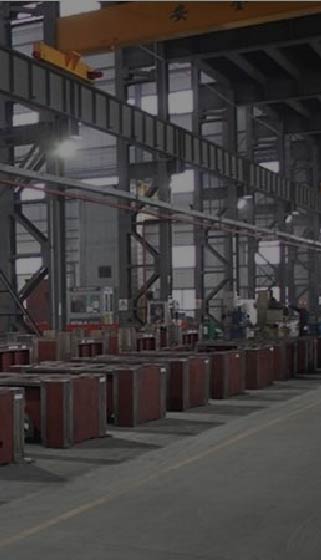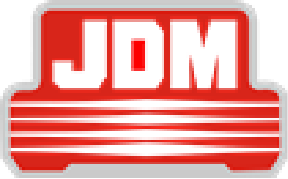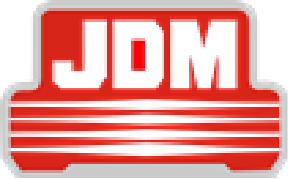







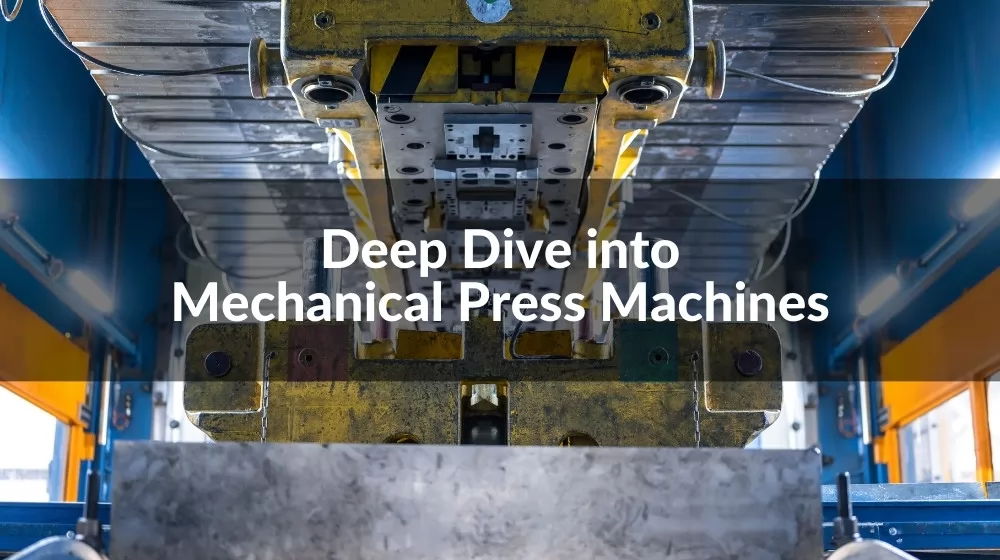
Welcome to the comprehensive world of Mechanical Press Machines – a pivotal element in modern manufacturing. This article delves deep into the intricacies of these machines, exploring their types, components, operating principles, and the vast array of applications they serve in various industries. Whether you're a seasoned professional or new to the field, this guide offers valuable insights into the mechanics, safety, maintenance, and purchasing considerations of Mechanical Press Machines, equipping you with knowledge to navigate this technical domain effectively.
Ever wondered how intricate metal shapes in everyday items are formed? Enter the world of Mechanical Press Machines, the backbone of the manufacturing industry. These robust machines are pivotal in shaping materials, especially metals, by applying significant force. They operate on a simple yet fascinating principle: transforming rotational motion into linear motion to exert pressure.
A mechanical press machine isn't just a piece of equipment; it's an embodiment of engineering excellence. The machine comprises several components, including a frame, bolster plate, and ram. The heart of the machine lies in its drive mechanism, which often includes a motor, flywheel, clutch, and gears. This setup allows for precise control over the force and speed, essential for various applications.
But why choose mechanical over other types? The answer lies in their reliability, speed, and capacity to handle large-scale production. They are favored in operations where accuracy and speed are paramount, such as in automotive and appliance manufacturing.
In conclusion, Mechanical Press Machines are more than just tools; they are the lifeline of modern manufacturing, shaping the world around us in countless ways. As we delve deeper into this topic, we'll explore the types, applications, and innovations surrounding these remarkable machines.
Diving deeper into the world of Mechanical Press Machines, we discover a variety of types, each tailored to specific manufacturing needs. These machines range from single-action to more complex triple-action presses, including specialized variants for unique applications.
The most basic yet widely used, single-action presses feature a single ram and are known for their simplicity and reliability. Ideal for straightforward pressing operations, they are a staple in workshops dealing with simple forming, punching, or blanking tasks.
A step up in complexity, double-action presses boast two rams. The first ram, often called the blank holder, holds the workpiece in place, while the second performs the actual pressing operation. This dual mechanism allows for more precise control, making these presses ideal for intricate shaping tasks.
Triple-action presses incorporate an additional ram, further enhancing precision and control. These are often used in applications requiring complex, multi-stage forming processes. The ability to perform multiple actions in one machine cycle makes them highly efficient for advanced manufacturing needs.
Apart from these standard types, there are specialized mechanical press variants designed for specific applications. These include transfer presses, which are used for mass production of complex parts, and forging presses, designed for shaping metal under extremely high pressure. Each variant brings its unique capabilities to the table, catering to the diverse needs of the manufacturing world.
Understanding the types of Mechanical Press Machines helps in selecting the right one for specific manufacturing tasks, ensuring efficiency and quality in production processes.
To fully appreciate the capabilities and efficiency of Mechanical Press Machines, it's essential to understand their basic components and the considerations that go into their design. Let's delve into the anatomy of these machines and what makes them so effective.
At its core, a mechanical press machine consists of several key components. The frame provides structural support and is typically made of high-strength steel to withstand the forces exerted during operations. The bolster plate and bed support the workpiece. The ram, also known as the slide, is the moving part that applies the pressure. Drive mechanisms, including gears and a flywheel, power the machine, while control systems regulate its operation.
The material and build quality of a press machine significantly impact its performance and durability. High-grade steel is commonly used for its strength and resistance to wear and tear. Precision in manufacturing is crucial for ensuring smooth operation and longevity. The quality of components like bearings, gears, and electrical systems also plays a vital role in the overall reliability of the press.
Efficient design is key to maximizing the productivity and effectiveness of a mechanical press. This includes optimizing the machine's ergonomics for ease of use, ensuring safety features are robust, and integrating advanced control systems for precision. Energy efficiency is also a significant factor, with designs increasingly focusing on reducing power consumption while maintaining performance.
In summary, the components and design of Mechanical Press Machines are a testament to engineering ingenuity. Balancing robust construction with sophisticated control systems, these machines are tailored to meet the demanding needs of modern manufacturing.
To harness the full potential of Mechanical Press Machines, it's crucial to understand their operating principles. These principles dictate how the machines work, the role of force, speed, energy, and the importance of control systems in ensuring efficient and precise operations.
At its most fundamental level, a mechanical press converts rotational motion into linear motion. This conversion is achieved through a drive mechanism involving a motor, flywheel, clutch, and gears. The rotational energy from the motor is stored in the flywheel and then transferred to the ram through the clutch and gears, applying force to the workpiece. This process allows for various operations, including punching, bending, and shaping of materials.
The effectiveness of a mechanical press is largely determined by its force, speed, and energy management. The force exerted by the press is a critical factor in shaping materials, and it must be precisely controlled to achieve the desired outcomes. Speed is equally important, as it influences production efficiency. Energy efficiency, focusing on minimizing waste while maximizing output, is a growing concern in press machine design.
Control systems play a pivotal role in mechanical presses. Modern presses are often equipped with sophisticated control systems, including programmable logic controllers (PLCs), sensors, and user interfaces. These systems allow for precise control over the press operations, enabling adjustments in force, speed, and stroke length. They also enhance safety, ensuring that the press operates within its designated parameters, and contribute to the overall efficiency and productivity of the machine.
In essence, the operating principles of Mechanical Press Machines revolve around efficient energy transfer, precise control, and adaptability to various manufacturing tasks. Understanding these principles is key to optimizing the use of these machines in industrial settings.
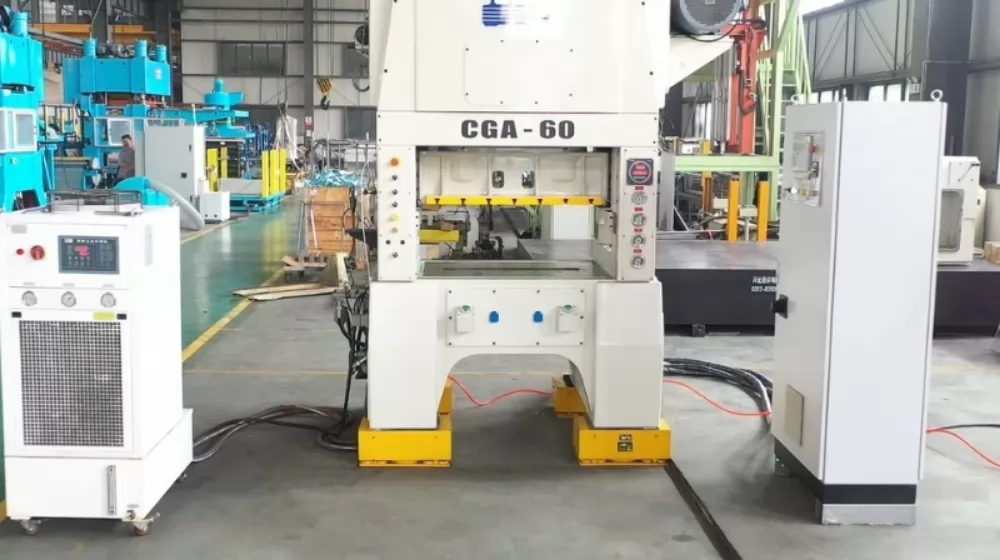
The versatility of Mechanical Press Machines is evident in their wide range of applications across various industries. From industrial manufacturing to specialized uses, these machines play a pivotal role in shaping, forming, and crafting materials.
In the industrial sector, mechanical presses are indispensable. They are used for a multitude of tasks including metal forming, stamping, and die cutting. These machines are crucial in the automotive industry for manufacturing body panels and engine components. In electronics, they help in the precise fabrication of components. Mechanical presses also find applications in packaging, where they are used for cutting and shaping packaging materials.
Within the broader scope of manufacturing, mechanical presses are used for bulk production, ensuring consistency and precision in high-volume tasks. They are particularly effective in producing uniform parts rapidly, a crucial aspect in industries such as appliance manufacturing, hardware production, and in creating structural components for construction.
Beyond these common applications, mechanical presses serve unique roles in various industries. In the aerospace sector, they are used for forming lightweight yet durable components. In the medical field, presses are instrumental in manufacturing medical devices and surgical tools. Even in the realm of fashion, these machines are used for fabricating metal accessories and embellishments.
This diversity in application underscores the flexibility and efficiency of Mechanical Press Machines, making them a cornerstone in modern manufacturing and industrial processes.
The effective and safe operation of Mechanical Press Machines hinges on stringent safety protocols and diligent maintenance routines. Understanding and implementing these practices not only ensures operator safety but also extends the lifespan and efficiency of the machines.
Safety in the operation of mechanical presses is paramount. This includes comprehensive training for operators, ensuring they are well-versed with the machine's functions and safety features. The use of personal protective equipment (PPE) is mandatory. Additionally, regular safety audits and adherence to industry standards help in minimizing the risk of accidents. Mechanical presses should be equipped with safety guards, emergency stop buttons, and sensors to prevent misuse and accidents.
Regular maintenance is crucial for the uninterrupted operation of mechanical presses. This involves scheduled inspections, lubrication, part replacements, and calibration. Keeping a maintenance log helps in tracking the machine's condition and scheduling timely service. Attention should be given to critical components like the clutch, brakes, and electrical systems to prevent breakdowns.
Operators should be equipped with basic troubleshooting knowledge to address common issues such as misalignment, unusual noises, or performance drops. Quick identification and rectification of these problems can prevent major malfunctions. In cases of complex issues, professional technicians should be consulted to ensure proper handling and repair.
In summary, the safety and maintenance of Mechanical Press Machines are critical aspects that require ongoing attention and care. By adhering to these practices, businesses can ensure the longevity and safe operation of these vital machines.
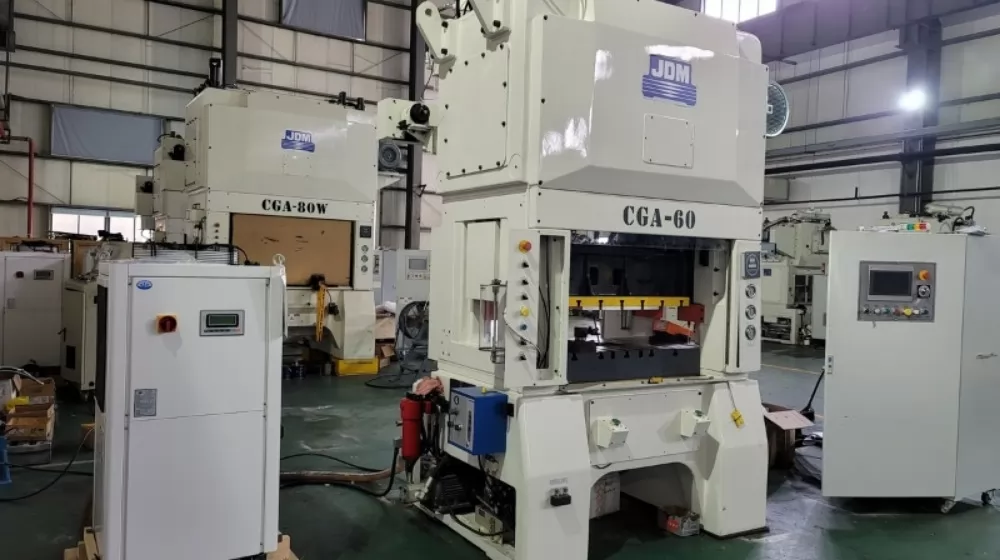
In the realm of manufacturing, the choice between Mechanical and Hydraulic Press Machines can significantly impact production efficiency, cost, and quality. Understanding the differences and the factors influencing the choice of a press machine is crucial for any manufacturer.
Mechanical presses are known for their speed and efficiency in high-volume production. They excel in operations where precision and repeatability are key. On the other hand, hydraulic presses offer versatility and the ability to deliver constant force over a longer stroke. They are preferred for applications requiring varied force applications and materials with different properties.
Several factors influence the decision between a mechanical and hydraulic press. These include the nature of the manufacturing process, material type, production volume, precision requirements, and the desired speed of operation. The available workspace and power sources are also important considerations, as hydraulic presses typically require more space and different power setups.
A cost-benefit analysis is vital in choosing the right type of press machine. Mechanical presses generally have a lower initial cost and are more energy-efficient, making them cost-effective for high-volume production. Hydraulic presses, while more expensive initially, offer greater versatility and control, which can be beneficial for specialized manufacturing processes. The long-term maintenance costs, potential downtime, and the lifespan of the equipment are also crucial factors in this analysis.
In conclusion, the choice between mechanical and hydraulic press machines depends on a comprehensive evaluation of production needs, financial considerations, and long-term operational goals. Both types have their unique advantages and can be the optimal solution in different manufacturing scenarios.
Investing in a Mechanical Press Machine is a significant decision for any manufacturing operation. This guide aims to simplify the process by highlighting key selection factors, introducing top manufacturers and brands, and providing insights into pricing and value.
When choosing a mechanical press machine, several factors need consideration. The capacity of the press, measured in tonnage, should align with your production requirements. The type of material being processed and the specific operations (such as stamping, forming, or cutting) are crucial in determining the appropriate machine. The size of the press and its compatibility with your existing manufacturing setup is also important. Additionally, consider the press's speed, energy efficiency, and the availability of after-sales support and spare parts.
There are several reputable manufacturers and brands in the mechanical press machine market. Some of the leading names include Komatsu, Amada, Schuler, and Aida. Each brand offers unique features and specializes in different types of press machines, catering to a wide range of industrial needs. Conducting thorough research and comparing different brands based on their reputation, quality of machines, and customer reviews is advisable.
The price of mechanical press machines varies widely based on their capacity, complexity, and brand. While it might be tempting to opt for a lower-priced model, consider the total cost of ownership, including maintenance, spare parts, and energy consumption. A higher initial investment in a quality machine can lead to long-term savings and a higher return on investment. It's also important to factor in the machine's resale value and the manufacturer's warranty and support services.
This guide is designed to assist you in making an informed decision when purchasing a Mechanical Press Machine, ensuring that you select a machine that meets your manufacturing needs and offers the best value for your investment.
In conclusion, the journey through the realm of Mechanical Press Machines reveals their indispensable role in shaping the manufacturing landscape. Understanding their types, components, and operational nuances is crucial for any industry professional. For those looking to invest in top-quality mechanical presses, JDM, a leading Chinese manufacturer, offers an impressive array of machines that exemplify durability, efficiency, and innovation. JDM's commitment to excellence positions them at the forefront of Mechanical Press technology, making them a go-to source for your manufacturing needs.


